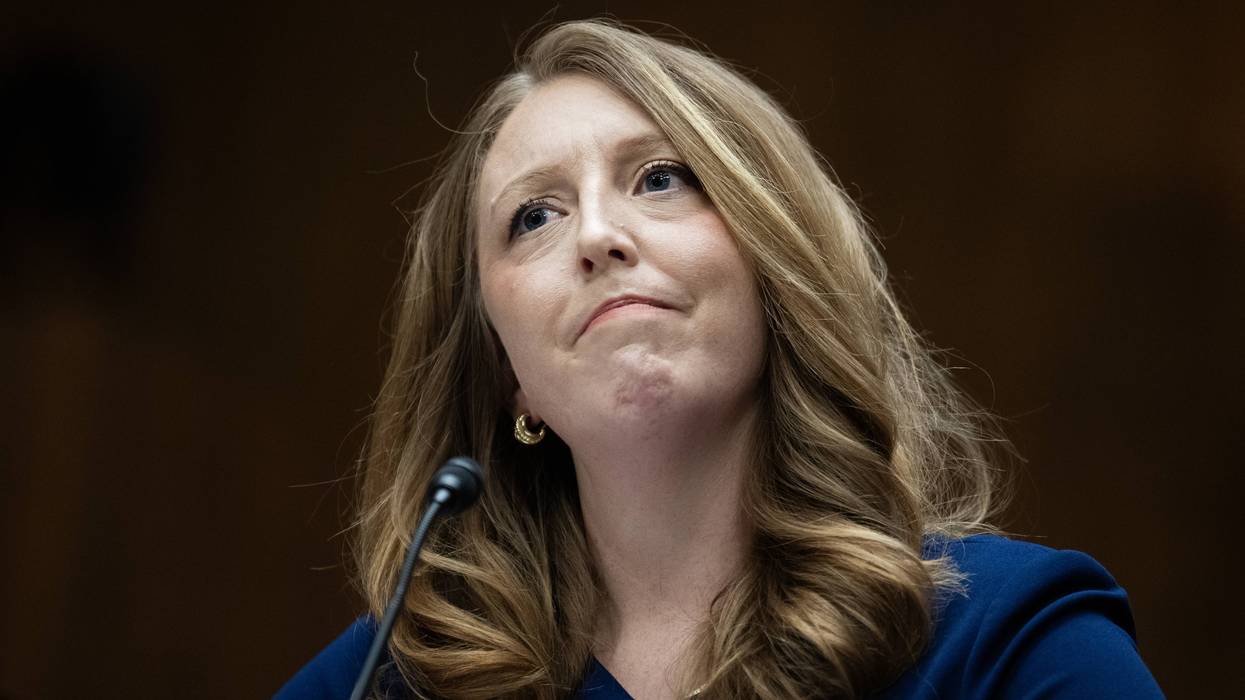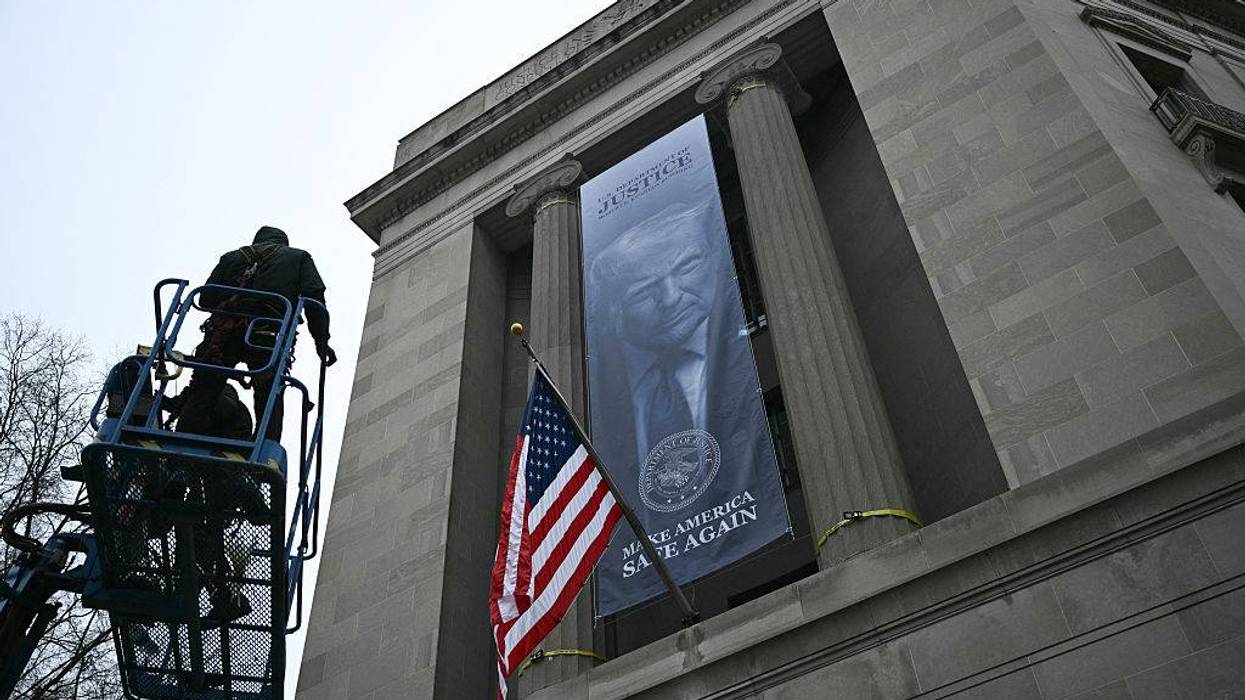Trump's Surgeon General Nominee Dodges Senators' Questions on Vaccines, Conflicts of Interest
"Means is another example of President Trump nominating someone with financial conflicts instead of qualifications," said one consumer advocate.
The US Senate's confirmation hearing for Casey Means, President Donald Trump's nominee to be the next US surgeon general, showcased "just how profoundly unqualified" the wellness influencer is to serve as the nation's top doctor, said one consumer advocate after Means dodged questions about her potential conflicts of interest, refused to affirm that anti-vaccine conspiracy theories have been debunked, and spread misinformation about contraception.
Means was nominated to the role on Health and Human Services Secretary Robert F. Kennedy Jr.'s recommendation, and her lack of a current medical license would make her an outlier among past surgeons general. Her license lapsed in 2024, and she did not finish her medical residency at Oregon Health and Science University, leaving in 2018 just months before she was set to complete it because, as PBS NewsHour reported last year, "she came to view the healthcare system as exploitative."
Means then became a self-described "metabolic health evangelist" and a social media wellness influencer, sharing a newsletter with her hundreds of thousands of followers to whom she marketed health products and supplements and earning tens of thousands of dollars in income doing so.
She is also the co-founder of a company called Levels, which offers a subscription for wearable glucose monitors—and which could benefit from Kennedy's endorsement of wearable medical devices.
Means signed a government ethics agreement last September stating she would resign from her advisory position at Levels and stop promoting wellness products for income, but Democrats on the Senate Health, Education, Labor, and Pensions (HELP) Committee, including Sen. Chris Murphy (D-Conn.), had questions about Means' recent potential conflicts of interest.
Murphy noted that Means failed to disclose her financial interests numerous times when promoting her lab testing platform, Function Health; Genova Diagnostics, another testing company that she sponsored; and Zenbasil seeds, a supplement that she recommended in her newsletter and whose maker she had a financial partnership with.
"This seems systemic," said Murphy. "It seems that in a majority of instances in which you were, as a medical professional, recommending a product, you were hiding the fact that you had a financial partnership."
Means responded by accusing Murphy's staff of "intentionally" mischaracterizing the data about her disclosures.
damn, Trump's surgeon general nominee Casey Means is a transparent bullshitter even by the standards of the regime. Watch how she's tries to blame Chris Murphy's staffers for the fact he has her dead to rights on being dishonest and corrupt.
[image or embed]
— Aaron Rupar (@atrupar.com) February 25, 2026 at 11:28 AM
"Means is another example of President Trump nominating someone with financial conflicts instead of qualifications—elevated precisely because of her opposition to the best science and fundamental public health principles," said Robert Weissman, co-president of government watchdog Public Citizen. "We need a surgeon general who understands that public health is, fundamentally, about taking care of each other, not leaving each of us to go it alone."
Considering Means' background, he added, "it is clear that Means will not push back on Trump and RFK Jr. as they put profits ahead of patients and anti-science views ahead of sound public health information. The already broken US healthcare system has been made much worse by Trump and his allies, who have gutted important health agencies and made dangerous cuts to health programs to fund tax cuts for billionaires."
“Casey Means has no place as US surgeon general, and every senator should reject her absurd nomination," said Weissman.
As in Kennedy's confirmation hearing last year, a number of questions from senators were related to Means' views on vaccination. Like the HHS secretary, during her career Means has expressed skepticism about immunization despite scientific studies and decades of evidence that have shown vaccines against diseases like polio and measles have prevented millions of deaths and amounted to some of the most successful public health interventions in history.
On Joe Rogan's podcast in 2024, Means allowed that "one vaccine probably isn’t causing autism" but asked, "What about the 20 that they’re getting before 18 months?”
There is no evidence that the childhood vaccine schedule in the US leads to autism. The increased number of vaccinations children receive today compared to the 1980s and '90s is frequently cited as a concern among vaccine skeptics, but the Children's Hospital of Philadelphia's Vaccine Education Center notes that the "immunological components in vaccines has dramatically decreased" due to "scientific advances in protein chemistry and protein purification that have allowed for purer, safer vaccines."
Means said Wednesday that "anti-vaccine rhetoric has never been a part of my message," but refused to answer several direct questions about immunization.
Sen. Bill Cassidy (R-La.), a physician, asked Means whether she would encourage Americans to be vaccinated against the flu.
Means replied that patients should "have informed consent with their doctor before getting any medication" and said that "vaccines save lives," but did not confirm whether she would endorse the flu vaccine.
CASSIDY: Would you encourage Americans to take the flu vaccine?
CASEY MEANS: I do think it's important as a physician and to rebuild trust in public health to make sure patients are encouraged to have informed consent with their doctors before getting any medication pic.twitter.com/b5JhGUMs5R
— Aaron Rupar (@atrupar) February 25, 2026
She also would not say whether she would recommend the measles vaccine as surgeon general. Nearly 1,000 children have been sickened with the highly contagious, preventable illness in South Carolina, and two children died of measles in West Texas last year, with the outbreaks spreading among the unvaccinated population in the affected areas.
"Would you encourage mothers to vaccinate their children with the measles-mumps-rubella vaccine, seeing how we've had children die?" asked Cassidy.
Means again said only that she is "supportive" of the vaccine but continued to focus her reply on the idea that parents should have "a conversation" with their doctor about immunization against deadly diseases.
Dr. Casey Means, Trump's nominee for surgeon general, won't unambiguously say that mothers should have their kids vaccinated against measles: "I do believe that each mother needs to have a conversation with their pediatrician about any medication they're putting in their… pic.twitter.com/tiqYv7eeAD
— Aaron Rupar (@atrupar) February 25, 2026
Angela Rasmussen, a virologist and Defend Public Health member, said Means' "only apparent qualification for the job of surgeon general is her willingness to promote RFK Jr.’s disinformation and quackery.”
Epidemiologist Elizabeth Jacobs, a member of the group's coordinating committee, added that "the leading US government voice on public health issues... must be someone Americans can trust to give credible advice based on solid science and real data, not a charlatan who specializes in selling expensive, unproven tests and treatments."
"It's time for the Senate to grow a backbone and say, 'Enough!'" said Jacobs, "starting with Casey Means."


